
I’ve been sitting on this post for a while. The problem was that even though I’ve spent a considerable amount of time working on it, it has been slow going. I figured it will be years more before I finished it at that rate. If you’ve got some ideas about the authors I haven’t been able to discover please drop a comment. In the meantime here’s what I’ve got:
 The Weird Circle was a 1940s half hour radio drama series that ran 78 episodes in syndication from 1943 to 1945 in the USA.
The Weird Circle was a 1940s half hour radio drama series that ran 78 episodes in syndication from 1943 to 1945 in the USA.
One story I suggest fans of SF check out is What Was It? by Fitz-James O’Brien, this 1859 story, starts off with all the proto-typical mumbo jumbo about seances and haunted houses and then takes a more Science Fictiony turn. It’s also, according to Wikipedia, one of the earliest modern stories about invisibility. The show’s producers primarily drew upon early and mid-19th century gothic fiction stories for their adaptations.
The final story in this series, The Black Parchment, seems something like a French version of The Monkey’s Paw.
Episodes:
The Fall Of The House Of Usher
Based on the story by Edgar Allan Poe; Performed by a full cast
1 |MP3| – Approx. 30 Minutes [RADIO DRAMA]
Broadcaster: MBS, NBC, ABC
Broadcast: August 29, 1943
Provider: Archive.org
The House And The Brain
Based on the story by Edward Bulwer-Lytton; Performed by a full cast
1 |MP3| – Approx. 30 Minutes [RADIO DRAMA]
Broadcaster: MBS, NBC, ABC
Broadcast: September 5, 1943
Provider: Archive.org
The Vendetta
Based on the novel by Honoré de Balzac; Performed by a full cast
1 |MP3| – Approx. 30 Minutes [RADIO DRAMA]
Broadcaster: MBS, NBC, ABC
Broadcast: September 12, 1943
Provider: Archive.org
The Narrative of Arthur Gordon Pym
Based on a novel by Edgar Allan Poe; Performed by a full cast
1 |MP3| – Approx. 30 Minutes [RADIO DRAMA]
Broadcaster: MBS, NBC, ABC
Broadcast: September 19, 1943
Provider: Archive.org
Declared Insane
Based on a story by Honoré de Balzac; Performed by a full cast
1 |MP3| – Approx. 30 Minutes [RADIO DRAMA]
Broadcaster: MBS, NBC, ABC
Broadcast: September 26, 1943
Provider: Archive.org
Based on the story Interdiction by Honoré de Balzac
A Terribly Strange Bed
Based on the story by Wilkie Collins; Performed by a full cast
1 |MP3| – Approx. 30 Minutes [RADIO DRAMA]
Broadcaster: MBS, NBC, ABC
Broadcast: October 3, 1943
Provider: Archive.org
What Was It?
Based on a story by Fitz-James O’Brien; Performed by a full cast
1 |MP3| – Approx. 30 Minutes [RADIO DRAMA]
Broadcaster: MBS, NBC, ABC
Broadcast: October 10, 1943
Provider: Archive.org
The Knightsbridge Mystery
Based on the story by Charles Reade; Performed by a full cast
1 |MP3| – Approx. 30 Minutes [RADIO DRAMA]
Broadcaster: MBS, NBC, ABC
Broadcast: October 17, 1943
Provider: Archive.org
First published in Life in 1882, later republished in Argosy (UK) Jul 1931.
The Horla
Based on the story by Guy de Maupassant; Performed by a full cast
1 |MP3| – Approx. 30 Minutes [RADIO DRAMA]
Broadcaster: MBS, NBC, ABC
Broadcast: October 24, 1943
Provider: Archive.org
William Wilson
Based on the story by Edgar Allan Poe; Performed by a full cast
1 |MP3| – Approx. 30 Minutes [RADIO DRAMA]
Broadcaster: MBS, NBC, ABC
Broadcast: October 31, 1943
Provider: Archive.org
First published in October 1839.
Passion In The Desert
Based on the story by Honoré de Balzac; Performed by a full cast
1 |MP3| – Approx. 30 Minutes [RADIO DRAMA]
Broadcaster: MBS, NBC, ABC
Broadcast: November 7, 1943
Provider: Archive.org
Turned into a film.
Mateo Falcone
Based on a story by Prosper Mérimée; Performed by a full cast
1 |MP3| – Approx. 30 Minutes [RADIO DRAMA]
Broadcaster: MBS, NBC, ABC
Broadcast: November 14, 1943
Provider: Archive.org
First published in 1829.
Turned into an opera.
The Man Without A Country
Based on Edward Everett Hale; Performed by a full cast
1 |MP3| – Approx. 30 Minutes [RADIO DRAMA]
Broadcaster: MBS, NBC, ABC
Broadcast: November 21, 1943
Provider: Archive.org
First published in Atlantic Monthly December 1863.
Dr. Manette’s Manuscript
Based on a story by Charles Dickens; Performed by a full cast
1 |MP3| – Approx. 30 Minutes [RADIO DRAMA]
Broadcaster: MBS, NBC, ABC
Broadcast: November 28, 1943
Provider: Archive.org
Adapted from the novel A Tale of Two Cities by Charles Dickens.
The Great Plague
By Thomas Hood (?); Performed by a full cast
1 |MP3| – Approx. 30 Minutes [RADIO DRAMA]
Broadcaster: MBS, NBC, ABC
Broadcast: December 5, 1943
Provider: Archive.org
Adapted from the short story A Tale Of The Great Plague by Thomas Hood.
Expectations Of An Heir
Based on a story by Samuel Johnson; Performed by a full cast
1 |MP3| – Approx. 30 Minutes [RADIO DRAMA]
Broadcaster: MBS, NBC, ABC
Broadcast: December 12, 1943
Provider: Archive.org
Adapted from The Lingering Expectation Of An Heir
The Hand
Based on a story by Guy de Maupassant (?); Performed by a full cast
1 |MP3| – Approx. 30 Minutes [RADIO DRAMA]
Broadcaster: MBS, NBC, ABC
Broadcast: December 19, 1943
Provider: Archive.org
Jane Eyre
Based on the novel by Charlotte Brontë; Performed by a full cast
1 |MP3| – Approx. 30 Minutes [RADIO DRAMA]
Broadcaster: MBS, NBC, ABC
Broadcast: December 26, 1943
Provider: Archive.org
The Murders In The Rue Morgue
Based on the story by Edgar Allan Poe; Performed by a full cast
1 |MP3| – Approx. 30 Minutes [RADIO DRAMA]
Broadcaster: MBS, NBC, ABC
Broadcast: January 2, 1944
Provider: Archive.org
The Lifted Veil
Based on a novella by George Eliot; Performed by a full cast
1 |MP3| – Approx. 30 Minutes [RADIO DRAMA]
Broadcaster: MBS, NBC, ABC
Broadcast: January 9, 1944
Provider: Archive.org
The Lifted Veil was first published in 1859.
The 4:15 Express
Based on the story by Amelia B. Edwards; Performed by a full cast
1 |MP3| -Approx. 30 Minutes [RADIO DRAMA]
Broadcaster: MBS, NBC, ABC
Broadcast: January 16, 1944
Provider: Archive.org
A Terrible Night
Based on a story by Fitz James O’Brien; Performed by a full cast
1 |MP3| -Approx. 30 Minutes [RADIO DRAMA]
Broadcaster: MBS, NBC, ABC
Broadcast: January 23, 1944
Provider: Archive.org
The Tell Tale Heart
Based on the story by Edgar Allan Poe; Performed by a full cast
1 |MP3| -Approx. 30 Minutes [RADIO DRAMA]
Broadcaster: MBS, NBC, ABC
Broadcast: January 30, 1944
Provider: Archive.org
Niche Of Doom
Based on a story by Honoré de Balzac; Performed by a full cast
1 |MP3| -Approx. 30 Minutes [RADIO DRAMA]
Broadcaster: MBS, NBC, ABC
Broadcast: February 6, 1944
Provider: Archive.org
Based on the story La Grande Breteche by Honoré de Balzac.
The Heart Of Ethan Brand
Based on a story by Nathaniel Hawthorne; Performed by a full cast
1 |MP3| -Approx. 30 Minutes [RADIO DRAMA]
Broadcaster: MBS, NBC, ABC
Broadcast: February 13, 1944
Provider: Archive.org
Based on the story Ethan Brand by Nathaniel Hawthorne. First published in .
Frankenstein
Based on the novel by Mary Shelley; Performed by a full cast
1 |MP3| – Approx. 30 Minutes [RADIO DRAMA]
Broadcaster: MBS, NBC, ABC
Broadcast: February 20, 1944
Provider: Archive.org
Feast Of The Red Gauntlet
Based on a novel by Sir Walter Scott; Performed by a full cast
1 |MP3| – Approx. 30 Minutes [RADIO DRAMA]
Broadcaster: MBS, NBC, ABC
Broadcast: February 27, 1944
Provider: Archive.org
Based on the novel Redgauntlet.
Murder Of The Little Pig
Based on a story by Émile Gaboriau; Performed by a full cast
1 |MP3| – Approx. 30 Minutes [RADIO DRAMA]
Broadcaster: MBS, NBC, ABC
Broadcast: March 5, 1944
Provider: Archive.org
Specter Of Tappington
Based on the story by Richard Harris Barham; Performed by a full cast
1 |MP3| – Approx. 30 Minutes [RADIO DRAMA]
Broadcaster: MBS, NBC, ABC
Broadcast: March 12, 1944
Provider: Archive.org
First published in 1837. Lieutenant Charles Seaforth is back from India, and will stay in “the oak room” a notoriously haunted room in Tappington manor. But when a skeletal specter steals Seaforth’s pants in the night he’s forced to wear his tropical shorts to breakfast!
Strange Judgement
; Performed by a full cast
1 |MP3| – Approx. 30 Minutes [RADIO DRAMA]
Broadcaster: MBS, NBC, ABC
Broadcast: March 19, 1944
Provider: Archive.org
Wuthering Heights
Based on the novel by Emily Brontë; Performed by a full cast
1 |MP3| – Approx. 30 Minutes [RADIO DRAMA]
Broadcaster: MBS, NBC, ABC
Broadcast: March 26, 1944
Provider: Archive.org
First published in 1847.
Curse Of The Mantle
Performed by a full cast
1 |MP3| – Approx. 30 Minutes [RADIO DRAMA]
Broadcaster: MBS, NBC, ABC
Broadcast: April 2, 1944
Provider: Archive.org
The Cask Of Amontillado
Based on the story by Edgar Allan Poe; Performed by a full cast
Performed by a full cast
1 |MP3| – Approx. 30 Minutes [RADIO DRAMA]
Broadcaster: MBS, NBC, ABC
Broadcast: April 9, 1944
Provider: Archive.org
A Rope Of Hair
Performed by a full cast
1 |MP3| – Approx. 30 Minutes [RADIO DRAMA]
Broadcaster: MBS, NBC, ABC
Broadcast: April 16, 1944
Provider: Archive.org
Falkland
Performed by a full cast
1 |MP3| – Approx. 30 Minutes [RADIO DRAMA]
Broadcaster: MBS, NBC, ABC
Broadcast: April 23, 1944
Provider: Archive.org
The Trial For Murder
Performed by a full cast
1 |MP3| – Approx. 30 Minutes [RADIO DRAMA]
Broadcaster: MBS, NBC, ABC
Broadcast: April 30, 1944
Provider: Archive.org
The Werewolf
Performed by a full cast
1 |MP3| – Approx. 30 Minutes [RADIO DRAMA]
Broadcaster: MBS, NBC, ABC
Broadcast: May 7, 1944
Provider: Archive.org
The Old Nurse’s Story
Performed by a full cast
1 |MP3| – Approx. 30 Minutes [RADIO DRAMA]
Broadcaster: MBS, NBC, ABC
Broadcast: May 14th, 1944
Provider: Archive.org
The Middle Toe Of The Right Foot
Performed by a full cast
1 |MP3| – Approx. 30 Minutes [RADIO DRAMA]
Broadcaster: MBS, NBC, ABC
Broadcast: May 28, 1944
Provider: Archive.org
The Dream Woman
Performed by a full cast
1 |MP3| – Approx. 30 Minutes [RADIO DRAMA]
Broadcaster: MBS, NBC, ABC
Broadcast: September 3, 1944
Provider: Archive.org
The Phantom Picture
Performed by a full cast
1 |MP3| – Approx. 30 Minutes [RADIO DRAMA]
Broadcaster: MBS, NBC, ABC
Broadcast: September 10, 1944
Provider: Archive.org
The Ghost’s Touch
Performed by a full cast
1 |MP3| – Approx. 30 Minutes [RADIO DRAMA]
Broadcaster: MBS, NBC, ABC
Broadcast: September 17, 1944
Provider: Archive.org
The Bell Tower
Performed by a full cast
1 |MP3| – Approx. 30 Minutes [RADIO DRAMA]
Broadcaster: MBS, NBC, ABC
Broadcast: September 24, 1944
Provider: Archive.org
Evil Eye
Performed by a full cast
1 |MP3| – Approx. 30 Minutes [RADIO DRAMA]
Broadcaster: MBS, NBC, ABC
Broadcast: October 1, 1944
Provider: Archive.org
The Mark Of The Plague
Performed by a full cast
1 |MP3| – Approx. 30 Minutes [RADIO DRAMA]
Broadcaster: MBS, NBC, ABC
Broadcast: October 8, 1944
Provider: Archive.org
The Queer Client
Performed by a full cast
1 |MP3| – Approx. 30 Minutes [RADIO DRAMA]
Broadcaster: MBS, NBC, ABC
Broadcast: October 15, 1944
Provider: Archive.org
The Burial Of Roger Melvin
Performed by a full cast
1 |MP3| – Approx. 30 Minutes [RADIO DRAMA]
Broadcaster: MBS, NBC, ABC
Broadcast: October 22, 1944
Provider: Archive.org
The Fatal Love Potion
Performed by a full cast
1 |MP3| – Approx. 30 Minutes [RADIO DRAMA]
Broadcaster: MBS, NBC, ABC
Broadcast: October 29, 1944
Provider: Archive.org
Mad Monkton
Performed by a full cast
1 |MP3| – Approx. 30 Minutes [RADIO DRAMA]
Broadcaster: MBS, NBC, ABC
Broadcast: November 5, 1944
Provider: Archive.org
The Returned
Based on a story by Neville Brand (?); Performed by a full cast
1 |MP3| – Approx. 30 Minutes [RADIO DRAMA]
Broadcaster: MBS, NBC, ABC
Broadcast: November 12, 1944
Provider: Archive.org
The Executioner
Based on the story by Honoré de Balzac; Performed by a full cast
1 |MP3| – Approx. 30 Minutes [RADIO DRAMA]
Broadcaster: MBS, NBC, ABC
Broadcast: November 19, 1944
Provider: Archive.org
First published in 1830.
Rappaccini’s Daughter
Based on the story by Nathaniel Hawthorne; Performed by a full cast
1 |MP3| – Approx. 30 Minutes [RADIO DRAMA]
Broadcaster: MBS, NBC, ABC
Broadcast: November 26, 1944
Provider: Archive.org
First published in 1844.
The Wooden Ghost
Based on a story by Sheridan Le Fanu; Performed by a full cast
1 |MP3| – Approx. 30 Minutes [RADIO DRAMA]
Broadcaster: MBS, NBC, ABC
Broadcast: December 3, 1944
Provider: Archive.org
Adapted from Schalken The Painter by Sheridan Le Fanu. First published in 1839.
The Last Days Of A Condemned Man
Based on the novel by Victor Hugo; Performed by a full cast
1 |MP3| – Approx. 30 Minutes [RADIO DRAMA]
Broadcaster: MBS, NBC, ABC
Broadcast: December 10, 1944
Provider: Archive.org
First published in 1829.
The Warning
????; Performed by a full cast
1 |MP3| – Approx. 30 Minutes [RADIO DRAMA]
Broadcaster: MBS, NBC, ABC
Broadcast: December 17, 1944
Provider: Archive.org
The Doll
????; Performed by a full cast
1 |MP3| – Approx. 30 Minutes [RADIO DRAMA]
Broadcaster: MBS, NBC, ABC
Broadcast: December 24, 1944
Provider: Archive.org
The Diamond Lens
Based on the story by Fitz-James O’Brien; Performed by a full cast
1 |MP3| – Approx. 30 Minutes [RADIO DRAMA]
Broadcaster: MBS, NBC, ABC
Broadcast: December 31, 1944
Provider: Archive.org
First published in 1858 in The Atlantic Monthly.
The History Of Dr. John Faust
Based on a story by anonymous; Performed by a full cast
1 |MP3| – Approx. 30 Minutes [RADIO DRAMA]
Broadcaster: MBS, NBC, ABC
Broadcast: January 7, 1945
Provider: Archive.org
Based on a chapbook story Historia von D. Johann Fausten first published in 1587.
Duel Without Honor
????; Performed by a full cast
1 |MP3| – Approx. 30 Minutes [RADIO DRAMA]
Broadcaster: MBS, NBC, ABC
Broadcast: January 14, 1945
Provider: Archive.org
The Spectre Bride
Based on a story by William Harrison Ainsworth; Performed by a full cast
1 |MP3| – Approx. 30 Minutes [RADIO DRAMA]
Broadcaster: MBS, NBC, ABC
Broadcast: January 21, 1945
Provider: Archive.org
First published in 1822.
The Tapestry Horse
????; Performed by a full cast
1 |MP3| – Approx. 30 Minutes [RADIO DRAMA]
Broadcaster: MBS, NBC, ABC
Broadcast: January 28, 1945
Provider: Archive.org
The River Man
????; Performed by a full cast
1 |MP3| – Approx. 30 Minutes [RADIO DRAMA]
Broadcaster: MBS, NBC, ABC
Broadcast: February 4 1945
Provider: Archive.org
Ancient Mariner
Based on a poem by Samuel Taylor Coleridge; Performed by a full cast
1 |MP3| – Approx. 30 Minutes [RADIO DRAMA]
Broadcaster: MBS, NBC, ABC
Broadcast: February 11 1945
Provider: Archive.org
Based on The Rime Of The Ancient Mariner by Samuel Taylor Coleridge. First published in 1798.
The Oblong Box
Based on the story by Edgar Allan Poe; Performed by a full cast
1 |MP3| – Approx. 30 Minutes [RADIO DRAMA]
Broadcaster: MBS, NBC, ABC
Broadcast: February 18 1945
Provider: Archive.org
The Mysterious Bride
Based on a story by James Hogg; Performed by a full cast
1 |MP3| – Approx. 30 Minutes [RADIO DRAMA]
Broadcaster: MBS, NBC, ABC
Broadcast: February 25, 1945
Provider: Archive.org
First published in 1830.
The Thing In The Tunnel
Based on a story by Charles Dickens; Performed by a full cast
1 |MP3| – Approx. 30 Minutes [RADIO DRAMA]
Broadcaster: MBS, NBC, ABC
Broadcast: March 4, 1945
Provider: Archive.org
Based on The Signal-Man by Charles Dickens. Later adapted as an audio drama for Hall of Fantasy (1950), Suspense (1956), Nightfall (1982) and Seeing Ear Theatre (1998?). A spectral figure in a dark railway tunnel has a message
The Moonstone
Based on the novel by Wilkie Collins; Performed by a full cast
1 |MP3| – Approx. 30 Minutes [RADIO DRAMA]
Broadcaster: MBS, NBC, ABC
Broadcast: March 11, 1945
Provider: Archive.org
Based on the novel The Moonstone by Wilkie Collins. First published in 1868.
The Pistol Shot
Based on a story by Alexander Pushkin (?); Performed by a full cast
1 |MP3| – Approx. 30 Minutes [RADIO DRAMA]
Broadcaster: MBS, NBC, ABC
Broadcast: March 18, 1945
Provider: Archive.org
Based on the short story The Shot by Alexander Pushkin. First published in 1830.
The Possessive Dead
????; Performed by a full cast
1 |MP3| – Approx. 30 Minutes [RADIO DRAMA]
Broadcaster: MBS, NBC, ABC
Broadcast: March 25, 1945
Provider: Archive.org
The Goblet
Based on the story by Ludwig Tieck; Performed by a full cast
1 |MP3| – Approx. 30 Minutes [RADIO DRAMA]
Broadcaster: MBS, NBC, ABC
Broadcast: April 1, 1945
Provider: Archive.org
Translated from German into English in 1827. Donaldo is the governor of an Italian island. He chooses a woman of low birth as his bride to be and gives her a series of engagment gifts, a silver ring, a silver pendant, and a silver goblet. The problem is, Francesca, his intened, has falllen in love with the silversmith!
The Case Of Monsieur Valdemar
Based on a story by Edgar Allan Poe; Performed by a full cast
1 |MP3| – Approx. 30 Minutes [RADIO DRAMA]
Broadcaster: MBS, NBC, ABC
Broadcast: April 8, 1945
Provider: Archive.org
Based on The Facts in the Case of M. Valdemar by Edgar Allan Poe. First published in 1845.
The Shadow
Based on a story by Hans Christian Andersen; Performed by a full cast
1 |MP3| – Approx. 30 Minutes [RADIO DRAMA]
Broadcaster: MBS, NBC, ABC
Broadcast: April 15, 1945
Provider: Archive.org
Based on The Shadow. First published in 1847. Classified as a “fairy tale.” A man’s shadow becomes another person and tries to control his life.
Bride Of Death
By ????; Performed by a full cast
1 |MP3| – Approx. 30 Minutes [RADIO DRAMA]
Broadcaster: MBS, NBC, ABC
Broadcast: April 22, 1945
Provider: Archive.org
A beautiful woman is fated to marry a dead man.
Dr. Jekyll And Mr. Hyde
Based on the novel by Robert Louis Stevenson; Performed by a full cast
1 |MP3| – Approx. 30 Minutes [RADIO DRAMA]
Broadcaster: MBS, NBC, ABC
Broadcast: April 29, 1945
Provider: Archive.org
The Red Hand
By ????; Performed by a full cast
1 |MP3| – Approx. 30 Minutes [RADIO DRAMA]
Broadcaster: MBS, NBC, ABC
Broadcast: May 6, 1945
Provider: Archive.org
A money hungry husband bent on murder chases his wife across France.
The Haunted Hotel
Based on a story by Wilkie Collins; Performed by a full cast
1 |MP3| – Approx. 30 Minutes [RADIO DRAMA]
Broadcaster: MBS, NBC, ABC
Broadcast: May 13, 1945
Provider: Archive.org
First published in 1878. Set in Venice.
Markheim
Based on the story by Robert Louis Stevenson; Performed by a full cast
1 |MP3| – Approx. 25 Minutes [RADIO DRAMA]
Broadcaster: MBS, NBC, ABC
Broadcast: May 20, 1945
Provider: Archive.org
This is a radical adaptation, set in a contemporary (to 1945) setting, and providing much of the presumed back-story (stuff that isn’t actually in the text of Stevenson’s original tale). First published in 1885 |ETEXT|.
The Black Parchment
By ????; Performed by a full cast
1 |MP3| – Approx. [RADIO DRAMA]
Broadcaster: MBS, NBC, ABC
Broadcast: May 27, 1945
Provider: Archive.org
Raphael Roland, a degenerate Parisian gambler intent on suicide, saves a drowning man in the Seine. In response he’s given a certain black parchment, written is Sanskrit, that grants wishes to the bearer. But, as an owner’s wishes are granted the parchment gets smaller and smaller and its owner gets older and older.
Posted by Jesse Willis

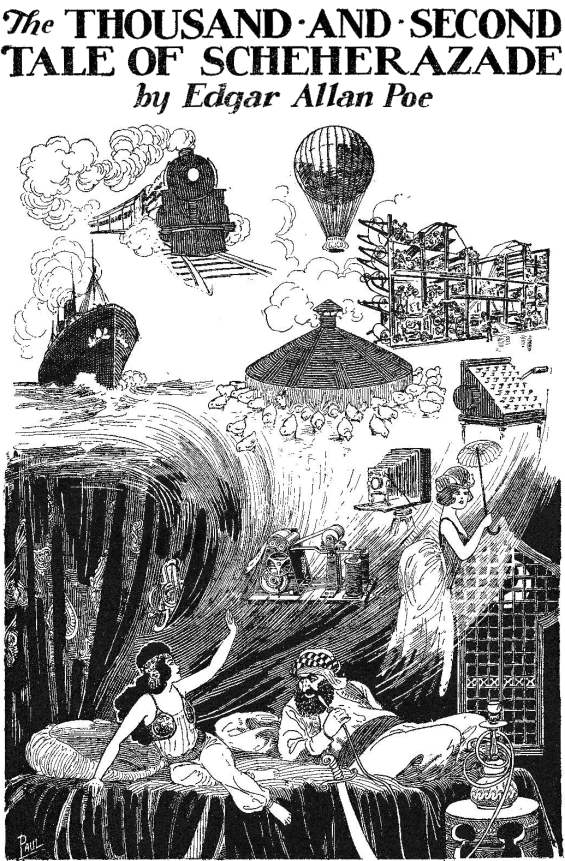
 The Thousand-And-Second Tale Of Scheherazade
The Thousand-And-Second Tale Of Scheherazade
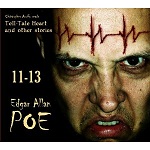
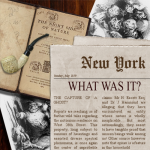


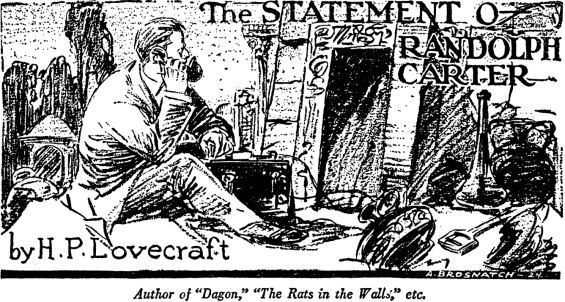
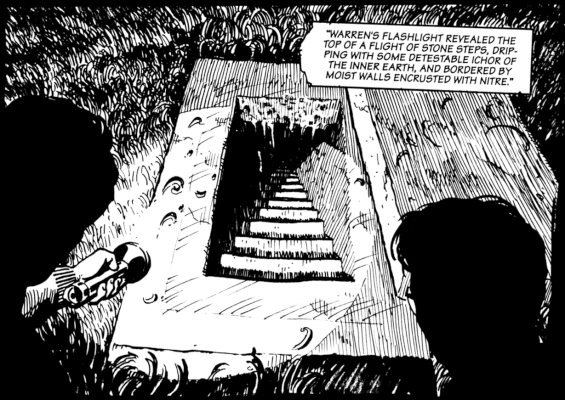
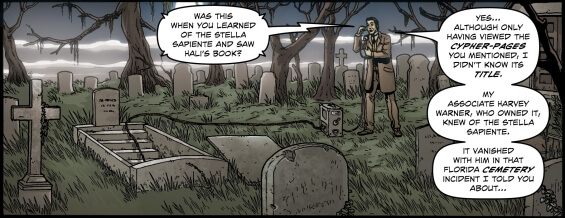
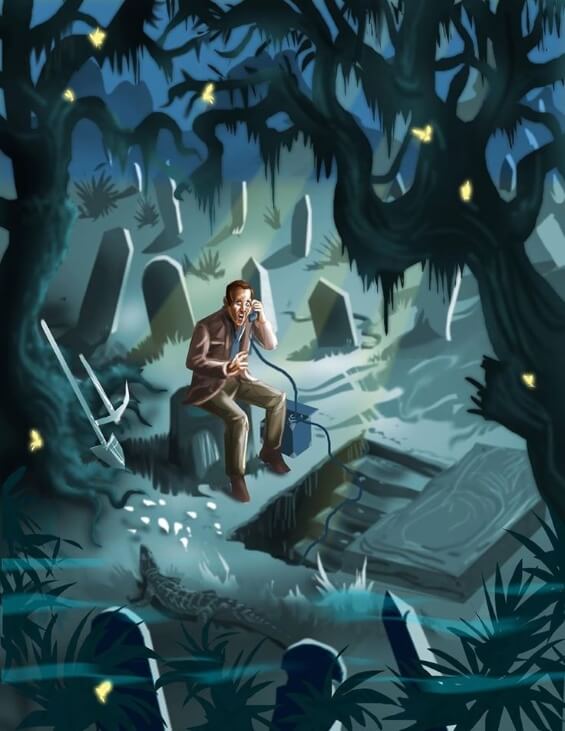




 The Weird Circle was a 1940s half hour radio drama series that ran 78 episodes in syndication from 1943 to 1945 in the USA.
The Weird Circle was a 1940s half hour radio drama series that ran 78 episodes in syndication from 1943 to 1945 in the USA.